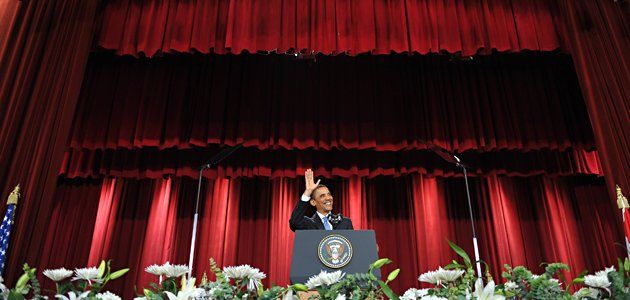
Just over a year ago the fledgling president of the United States stood before a capacity crowd at Cairo University in Egypt and promised "a new beginning" for relations between America and the Muslim world. But now controversy over the proposed Muslim center near Ground Zero, the much-publicized flap over Pastor Terry Jones's planned Quran burning, and allegations of atrocities by U.S. troops in Afghanistan seem to have dashed such hopes.
"So long as our relationship is defined by our differences," Barack Obama said in a speech widely lauded around the world at the time, "we will empower those who sow hatred rather than peace, and who promote conflict rather than the cooperation that can help all of our people achieve justice and prosperity. This cycle of suspicion and discord must end."
Spoken by America's first black president, a man who spent some of his childhood in Muslim-dominated Indonesia, those words meant something—especially coming on the heels of the Bush presidency, Abu Ghraib, and Guantánamo Bay. Indeed, wrote one prominent American Muslim leader in The Washington Post, "The historic significance of President Obama's speech to the Muslim world in Cairo cannot be overstated."
That leader was Imam Feisal Abdul Rauf of the Cordoba Faith Initiative. Just a month later, in July 2009, a group of Muslims led by Rauf bought an old Burlington Coat Factory a few blocks from Ground Zero, and began using it as a prayer space. Over several months, their plan to convert the building into an interfaith center, with a Muslim prayer room, became warped in the public consciousness, labeled as "the Ground Zero mosque."
Figures from Sarah Palin to Donald Trump blithely conflated the peaceful Sufi strain of Islam practiced by Imam Rauf with the terrible deeds perpetrated by the twisted zealots of Al Qaeda on 9/11. Opponents of the mosque were called bigots. Its supporters were accused of desecrating the "holy ground" where the World Trade Center once stood. Muslims around the world watched. "America hates Islam," one man in Baghdad told The New York Times, in reference to the growing animosity.
As the debate reached its most hysterical peak, the actions of Terry Jones, leader of a tiny church in Florida, were magnified and projected across the world. Jones's proposed "Burn a Koran Day," scheduled for the ninth anniversary of 9/11 (and now tentatively suspended in unclear circumstances that may or may not involve a meeting between Jones and Rauf), caused protests around the Muslim world, from Jakarta to Kabul, where people burned the American flag. An estimated 10,000 rioted in northern Afghanistan, according to Reuters, throwing stones at NATO troops. One man was shot dead.
Islamic terrorists have made the Internet their own. Material like this, posted on message boards, in YouTube videos and in e-mails, mixed with their traditional recruiting imagery from Guantánamo and Iraq, might have been enough to put paid to Obama's vision for friendship with the majority of Muslims. But today, 12 U.S. soldiers were charged with what Reuters called "gruesome crimes in Afghanistan ranging from murdering civilians to keeping body parts as war trophies." The Guardian reports that the men are accused of forming a squad to kill Afghans for fun, and keeping fingers as souvenirs. "Clearly, even if these allegations are proved to be untrue," Pentagon spokesman Geoff Morrell said, "it is unhelpful. It does not help the perceptions of our forces around the world."
American perceptions of Muslims are not much better. President Obama, a Christian, is frequently misrepresented as Muslim. It often seems like a veiled insult. "It is easier to start wars than to end them," Obama said at the end of his speech last year. "It is easier to blame others than to look inward, to see what is different about someone than to find the things we share. But we should choose the right path, not just the easy path." It seems as if the choice was made for him.
Uncommon Knowledge
Newsweek is committed to challenging conventional wisdom and finding connections in the search for common ground.
Newsweek is committed to challenging conventional wisdom and finding connections in the search for common ground.





